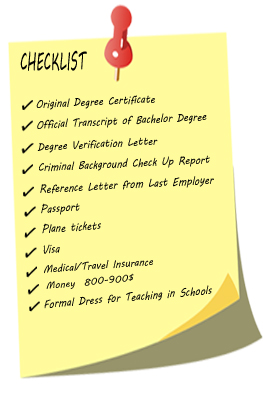Sending Money Home
Sending Money Home from Thailand - Information for TEFL Teachers
There are generally no restrictions on receiving money in Thailand, but sending money is or walking out of the country with money is comparatively more controlled and legalized. Many new regulations were put into place as a result of the 1997 economic collapse and currency speculation which caused the Thai baht to fluctuate and become more unstable.
Setting up a bank account in Thailand is easy and quick, as long as there is a valid passport to furnish. Bank accounts are favorable modes for foreign nationals to transfer money to and from abroad. To send money or to receive cash, you will need your passport in hand. Transferring money will require an invoice from the remote receiver, and you should bring as much documentation as you can.
Western Union however is the fastest way to send money, e.g., same day, but is also the most expensive way. One just has to go pick up the money at the Western Union office if one’s at the receiving end. The outlets are located in certain Central Department stores in Bangkok..
Wiring money from an overseas bank account to your Thai bank account (or vice versa) usually takes one to three days. It can take stretch to more than a week as well, depending upon the banks and the system used. They often turn out to be pretty expensive.
One of the cheapest ways is to send an international cashier's cheque or money order which you prepare at a bank, e.g., Siam City Bank as recommended by several people. Such a cheque should be sent by a registered international courier, e.g., DHL.
It is suggested, not to use the post office Money Order service. The concept of money order cheque there is not very dependable.
Currently, it is said that you can walk out with up to 50,000 baht. To convert Thai baht into cash without any other documentation, you will need to bring your plane ticket and your passport.



 I heard great things about this TESOL course from 4 different people who went through it last year. I have always wanted to travel and teach, so this program was perfect for me.
I heard great things about this TESOL course from 4 different people who went through it last year. I have always wanted to travel and teach, so this program was perfect for me.  After looking at other programs in Thailand, I found ACT was offering the lowest price. Also, Kiersten and I came together and her friends had previously done the ACT program and they had nothing but good things to say about the program.
After looking at other programs in Thailand, I found ACT was offering the lowest price. Also, Kiersten and I came together and her friends had previously done the ACT program and they had nothing but good things to say about the program.  The ACT program seemed to be a great way to receive hands on training. It was a great learning experience. Sangeeta and Pak did a great job throughout and I was continually impressed with them and how professional the company was.
The ACT program seemed to be a great way to receive hands on training. It was a great learning experience. Sangeeta and Pak did a great job throughout and I was continually impressed with them and how professional the company was. 